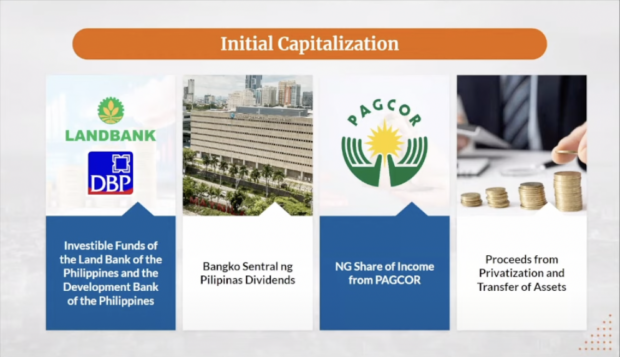Villar, head of the chamber’s panel on banks, financial institutions and currencies, detailed the oversight measures set in place “to ensure accountability and proper governance of the fund.”
READ: Mark Villar files Maharlika Investment Fund bill at Senate
Among these include having an internal auditor to provide interim financial and management reports, enjoining an internationally recognized auditing firm to serve as an external auditor to audit the MIF financial statements, and subjecting the fund’s books and accounts to the “strict examination” of the Commission on Audit.
Villar said a joint Congressional oversight panel would likewise be formed with five members from the Senate and the House of Representatives to “oversee, monitor and evaluate” the MIF implementation.
“Finally, as an additional measure for transparency, all documents of the fund and the Maharlika Investment Corporation shall be open, available, and accessible to the public,” the senator pointed out.
Villar also noted that exemptions and privileges were scrapped from the originally filed MIF proposal “to ensure a level playing field.”
“The transactions of the Maharlika Investment Corporation (MIC) and the MIF shall be subject to local and national taxes,” he noted.
Defending GFIs as source for MIF
Villar outlined the proposed source for the initial funding and capitalization of the MIF:
- Land Bank of the Philippines (LBP) – P50 billion
- Development Bank of the Philippines (DBP) – P50 billion
- National Government – P50 billion

Screenshot from Senate of the Philippines on YouTube
Federation for Economic Freedom president Calixto Chikiamco said that the MIF would be acceptable if it does not seed money from the BSP and other government financial institutions (GFIs).
READ: Maharlika fund ‘acceptable’ if not funded by BSP, gov’t financial institutions — expert
But Villar came in defense of the involvement of GFIs as a source of funds for the MIF.
“The involvement of these GFIs as contributors to the initial seat fund is reasonable and will not cut out the other lending obligations that they need to fulfill under their respective mandates. In fact, the expected return of Maharlika, which is estimated to be around 8.6% on average, is much higher than their cost of capital and the return in their current investment placements,” he argued.
The senator then assured that the MIC “will be run professionally and on a commercial basis” like other government-owned and controlled corporations (GOCCs).
It will pay taxes and obey the GOCC Governance Act of 2011 and the Government Procurement Reform Act “except in the engagement of professional or technical services necessary for the selection of investments,” he added.
To ensure that the MIF will yield its expected gains, Villar said, “the fund will be established with the highest standards of accountability, fiscal responsibility, and good governance.”
Who has a hand in the MIF?
Villar explained that the MIC would be governed and managed by a nine-member board of directors, with the Secretary of Finance sitting as its chairperson.
The chief executive officer of the MIC will be the vice chairperson, while the other members include the presidents of the LBP and the DBP, three independent directors from the private sector, and two regular directors.
Screenshot from Senate of the Philippines on YouTube
“The economic team will work closely with the fund’s administrators as its advisory board to help ensure that they will comply with proper financial reporting and auditing standards. This is also to align investment decisions with fiscal and monetary policies,” Villar said.
According to the senator, the advisory body will include the chiefs of the Department of Budget and Management, National Economic and Development Authority (Neda), and Bureau of the Treasury.
‘Timely measure’
In his bid to persuade his fellow senators, Villar pointed out that the MIF is “designed to catalyze economic development by mobilizing government financial assets that are otherwise limited in use by current legal frameworks.”
“As policymakers, we have to take bold steps towards exploring measures that would contribute to high growth that cannot be easily reversed by external headwinds and future crises. This is a timely measure that should be given utmost attention and urgency by this Congress,” he stressed.
Villar said the MIF is a crucial instrument in generating “consistent and stable investment returns” to boost the country’s long-term development goals like the medium-term fiscal framework, eight-point socioeconomic agenda and the Philippine Development Plan 2023-2028 “in a way that will ease the pressure on the government’s fiscal space.”
He added that the MIF would also hasten the implementation of Neda-endorsed infrastructure projects, including tollways, public road networks, water, green energy, agro-industrial ventures, and telecommunications.
Deliberations on the MIF bill were suspended to allow other lawmakers to study the proposal further.
The MIF proposal faced harsh criticism from other senators when discussed in the Villar-led committee.
Several lawmakers had grilled the proponents of the wealth fund for their inability to address doubts about its organizational structure, fund sources, and safeguards against potential fraud.
READ: Senators remain unconvinced of Maharlika: ‘So disappointing’